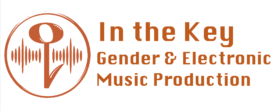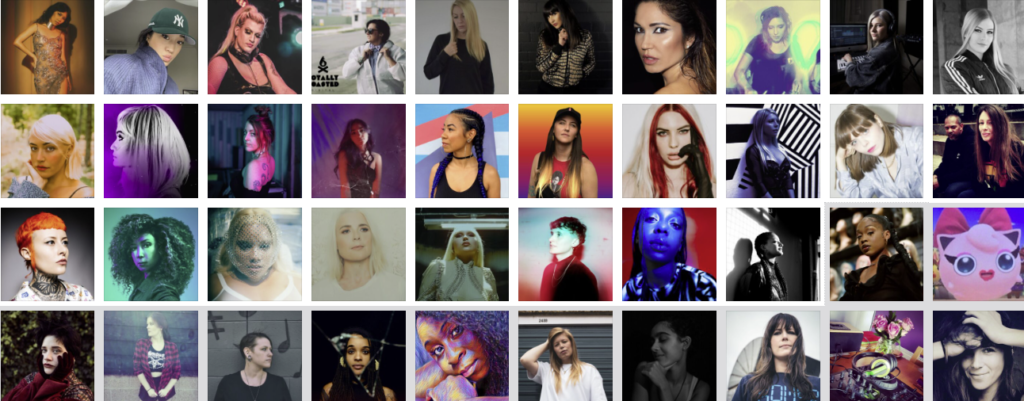Last Friday wonderful ‘critical music’ journalist Anu Shukla from Resident Advisor ran a story on the In the Key of She Producer Directory – a database of 250+ artists who identify as female, trans or non-binary that Alex Wright and I have been putting together over the past few months. One of the first findings from In the Key of She project – which has been exploring the career experiences of female producers – was that despite the low percentages bandied about in industry commentary, there are plenty of women producers out there. So in addressing gender imbalance in electronic music production, the question is as much ‘How can we raise the visibility of gender minority artists?’ as it is ‘How can we encourage more women to make music?’.
Generally speaking, minorities are less visible because there’s just less of them (clue’s in the name, huh?). The way the industry is structured around networks and relationships, means success is often built on who you know. This means minority artists are hard to find, unless you go looking for them in specific spaces. This is how ‘the boys club’, cliques, and ‘bro culture’ come into being – scientifically speaking, it’s Eve Sedgwick’s concept of homosociality – we are drawn to those who most closely mirror ourselves in order to form alliances that benefit us – it’s the essence of society. It serves a function. But by definition, it also leads to concentrated sameness because ‘people like us’ are also likely to be the same gender, race, skin colour, class, background, sexuality etc. So if you’re truly interested in fostering diversity you have to go looking for the people who ‘aren’t like us’ – and then you might find that we are more alike than perhaps we first thought. But that’s not straightforward when you’re in the dominant group – its far easier to just carry on as you always have, because reaching out to others takes courage, and if you are a decent human being, frankly it’s uncomfortable. It requires you to confront your own prejudices, most of which you weren’t even aware you had. Ouch. This is why otherwise perfectly kind, decent people don’t do anything about inequality – because it’s so much easier not to. This is the definition of privilege. And the ItKoS Directory was designed to make the process of finding people ‘not like us’ as painless and comfortable as possible – just like the Black Artist Database has done for black and brown artists in the wake of the BLM resurgence in 2020.
It’s easy to hide from your discomfort by falling back on arguments of meritocracy – “its all about the music, please don’t bring gender into this…” implored one of many similar comments on the RA Facebook page when they publicised the Directory story. And to some extent that’s a laudable sentiment in the context of a hyper-commercialised electronic music industry where image is everything, a strong social media game has risen to the near top of the critical success factors for a DJ/Producer, and in an industry that has lost touch with the underground roots that feed and water it, and make it flourish. But what if we live in a world where its just easier for some people to make music than it is for others, just because of who they are? Is it all about the music then? If the suffragettes had ‘just left gender out’ of politics back in the early twentieth century, women would still not have a vote, be able to own property in their own name, hold a bank account or even go to work after they married, let alone after they’d had children. How comfortable do you feel saying ‘just leave race out of it’ when yet another white shooter in the USA travels hundreds of miles just to annihilate black folks as they go shopping FFS?
Identity politics is present in everything, and to pretend it isn’t is a sign you’re not questioning your own privilege. As a white woman, I have to do that constantly because I’ve been brought up in a society where whiteness is the norm, and I am insulated from the struggles my black sisters face – how can I possibly know how it is to go through life in a different skin to my own unless I actively think about that? In relation to gender, this is perfectly captured in the following quote from the AFEM Gender Diversity in the Electronic Music Industry Report: “I am a white male with work experience so things will probably go easier for me even though I might not directly feel it. Like cycling with the wind in your back”. I’ve referred to this elsewhere in my writing on inequality and I’ll keep on doing so because it’s such as great metaphor. As an (ex) long distance runner I never got used to the fact that the same seafront route could feel ten times harder when I switched direction and started running into the breeze – and that great time I’d just done? I didn’t even notice the wind at my back gently pushing me along to a personal best. In just the same way, I can’t notice white privilege easing my passage through life until I turn round and look.
I actually sat down to write a slightly different article this morning, setting out the concept of ‘Ameliorative Work’ that my friend and co-author Dr Marjana Johansson and I have been developing from the 60 or so interviews I’ve now carried out for In the Key of She. It’s a term we’ve coined to take account of all the activities minorities have to do just to make life bearable, let alone improve things, as they go about their work. It’s all the exhausting, time-hungry, costly work that happens before, and around ‘doing the job’ that those who are not a minority never have to undertake, and probably don’t even know exists. It’s the real reason why the playing field in the creative industries (or any other for that matter) is not level and I have lots more to say about it! But as all this fell out instead when I got to my keyboard, I think I’ll leave Ameliorative Work as a follow-up to this because, well tl:dr, right?

